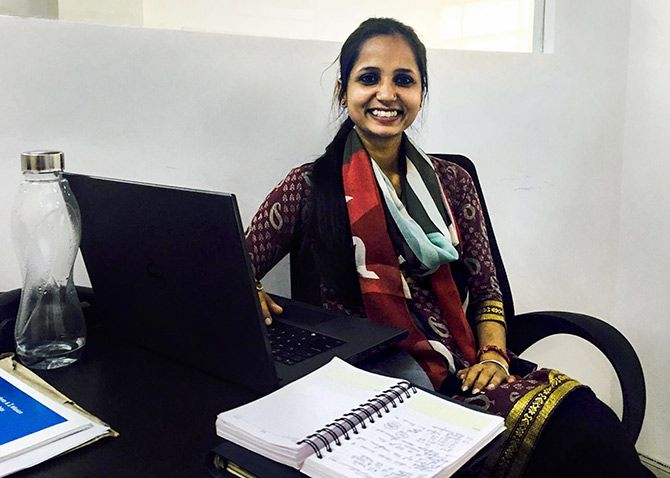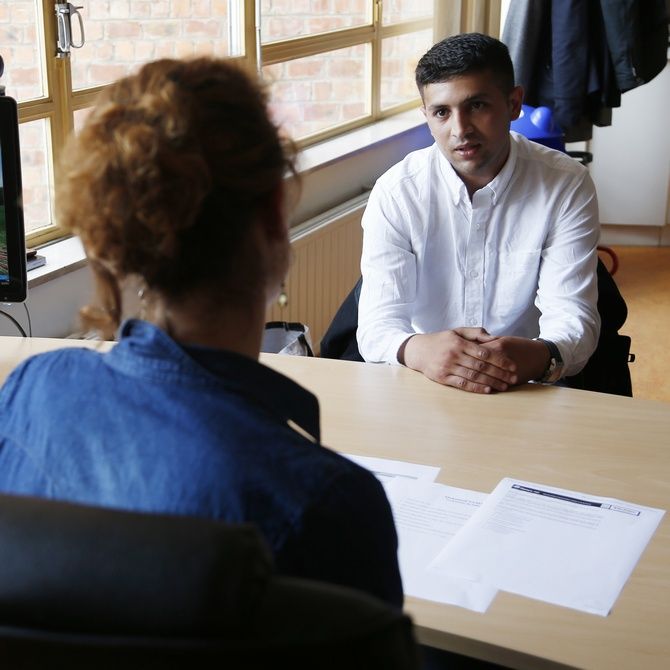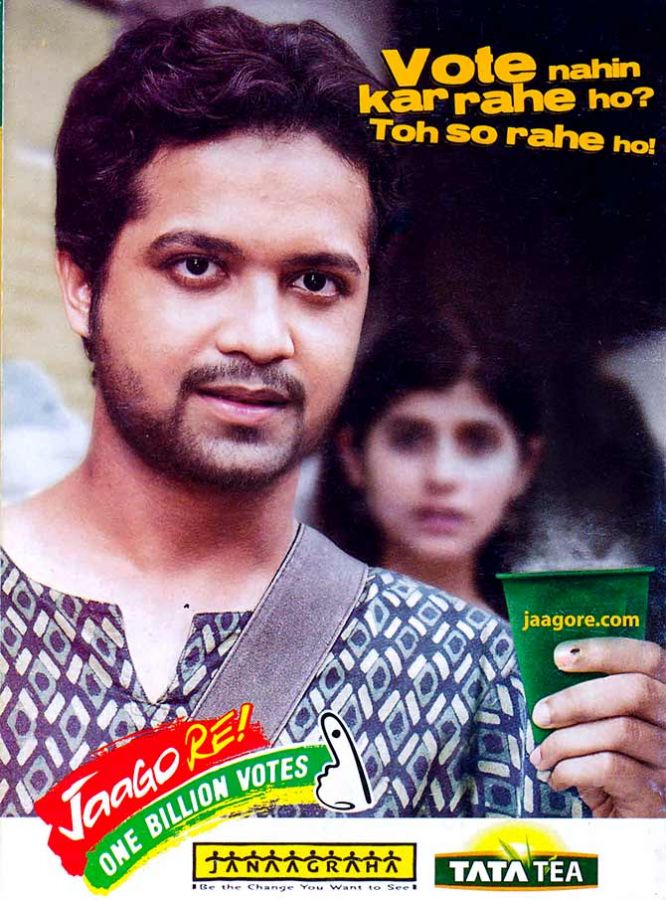'I believe that to be a successful leader, you need to develop fly vision.'

'At a talk I once gave at a B-school,' Sangeeta Talwar recalls in her recent book The Two Minute Revolution: The Art Of Growing Businesses, 'a bright young student asked me, "Ma'am, how much of your success do you attribute to luck and how much to endeavour?"
'"It's a tough question and, in my view, your success is determined by the choices you make. Nothing comes easy to anybody, but those who try harder are more likely to make things happen than those who don't",' Talwar writes.
'We often don't credit ourselves enough for what happens to us. Being in the right place at the right time is a function of something you choose to do in the past that put you there. I'm sure each one of us can trace our successes (and failures) back to some choices we made -- even if those choices were far in the past and have no direct connection to the event at hand,' Talwar notes in her much recommended book.
No one in her family had anything to do with the world of business.
But that was exactly where Sangeeta Talwar knew she wanted to carve her career.
After graduating from IIM-Calcutta, she took up her first job at Nestle where she rose swiftly through the ranks and handled a product that almost every Indian has tucked in to at some point: Maggi Noodles.
"I worked with Nestle for 21 years," she says with great fondness and pride.
At Nestle, she began with Maggi Cubes, a product that even the sales team made jokes about, she says. But her work was noticed and she was soon responsible for Maggi Noodles.
Her career trajectory took her through the Tata Global Beverages Group, Mattel Toys India Limited and the National Dairy Development Board before she launched a consultancy, FlyVision.
She continues to remain on the board of several companies, including Castrol India Limited, GlaxoSmithKline and HCL Infosystems.
She is on the board of governors of her alma mater, IIM-Calcutta.
But the foundation for her achievements, she tells Savera R Someshwar/Rediff.com, was laid even before she began working.
And, along the way, she discovered her own unique mantra for success.

Like many Indian women, you faced your first hurdle before you started working.
Your mother wanted you to go the traditional way and get married.
Your father wanted you to take another traditional route and become an IAS officer.
You wanted to do something completely non-traditional; you wanted to get into business.
Did you feel overwhelmed or frightened by your decision at any point?
I can't say I have always been brave, but I can say I have been courageous. I have been fearful at times, but have not let that emotion overwhelm me.
I must have got that the ability to get over fear and keep doing what you are doing from my parents.
My father worked as a district magistrate and would tell stories about some of the difficult times he faced when he was threatened with death.
My mother, who was a teacher, was extremely brave. She fell very ill at the age of 32 and that illness stayed with her till the time she passed away. But she never let it stand in the way of what she wanted to achieve in life.
As a young girl, you faced many incidents of eve-teasing. Did it...
Did it prepare me for the corporate world?
I think it did.
When I was in college, one of the things I decided was that I wouldn't take pocket money. So I used to teach a few kids.
I also did a bunch of other things. I used to learn music. I learnt dance for a short while. I learnt Russian for one year. All this meant I had to travel all over Delhi.
That taught me that you can't predict what is going to happen in your environment. You can only be aware and try to be as cognisant as you can and be safe. You can't let it deter you.
This attitude carried over into my work environment because I used to travel a lot at a time when there was no food, no packaged water, no phones.
There was one airline. We used to travel by car, by bus, by train, all modes of travel. At times, we inadvertently faced dangerous situations.
But it never deterred me.
In that sense, it prepared me at least, attitudinally, to take on whatever comes with the job and try to do your best with it.

Did the fact that you worked before you graduated help you when you began your career? Is it something that you would recommend for today's youngsters?
I am not so sure about that. I think it can go both ways.
If your experience is good and you are strong enough handle what comes your way, it can be positive; it can be a confidence builder.
But if you are really not the kind of person who can take a little setback in your stride at that age, it may work against you. It may reduce your self-confidence.
I don't think there is a magic formula here.
There were two factors working for me. The first was my clarity that this is what I want to do and the fact that I got the opportunity to do so.
The other factor was that my parents let me be.
Once they were clear that I wanted to study and I wanted a career and I was not just going to get married, they never came back to that subject again.
They were quite liberal actually. They allowed their children the freedom to be out and about. They didn't mollycoddle us.
So you are saying that not every youngster is cut out for internships and work experiences before a certain age.
It depends on the person. If you are too young and can't take rejection, it can dent your self confidence. That's the limited point I am making.
These days, I find that while kids seem to grow up faster, they seem to remain kids much longer. We were much more mature at each stage.

You have an interesting success mantra...
I believe that to be a successful leader, you need to develop fly vision.
Fly vision is about flying with the birds.
When you ricochet out to that height, 20,000 feet plus, your whole perspective changes because new horizons emerge and you start thinking and looking at business opportunities differently.
Suddenly, you review and reconjecturise where you are and where you could go.
But it is equally important to be like a fly.
A fly has almost 360 degree vision. It is very sensitive to movements around it. It is very, very aware. It can see all around itself; it can see the details.
You need to be aware of the competition and you need to be able to work through the details to bring in excellence in execution.
If you can do both, fly with the birds and be a fly, then you can be successful.
Unless great strategic thinking is backed up with great excellence in execution, it won't bring in business.
When it came to Maggi Noodles, our biggest challenge was to sell a string that mothers felt looked like worms. How do you sell that to a country that does not know noodles?
With Tata Tea, the challenge was tea to a country of tea drinkers where big brands and small local brands were jostling for market space. We told ourselves that we were the leaders in the world's largest tea market.
To become a leader, you have to think like a leader and behave like a leader.
What does a leader do? He does things that shifts categories, that shifts mindsets.
We decided to get out of this my-cup-of-tea-is-more-rejuvenating-than-that-guy's-cup-of tea... ; the typical man comes home from work, housewife serves him chai and he feels refreshed.
Thus, the memorable 'Jaago Re' campaign changed Tata Tea's future.
*Image used for representational purposes only.

Illustration: Dominic Xavier/Rediff.com









